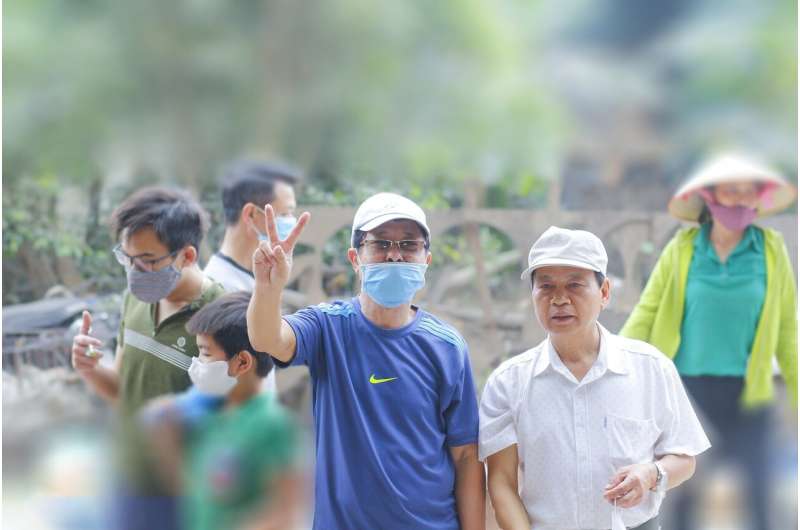Why is COVID-19 so deadly to elders?

Today, like every day, Eric Verdin will cycle the steep hills of Marin County. He'll wait until noon to eat his first meal. He'll wear a mask and stay socially distanced. He'll be asleep no later than 11 p.m.
Despite his excellent health, the 63-year-old scientist and CEO of the Buck Institute for Research on Aging knows he must do everything he can to protect himself from this hard truth: As we age, our body's elegant symphony of immune cells turns dissonant. We may feel fine. But our hidden defenses no longer fully shield us—and may turn against us.
As COVID-19's case count explodes, "This is the time more than ever to adopt the healthiest lifestyle that you can," he said. "Sleep, nutrition and exercise is the trifecta that will position you to respond to the virus in the best way possible. You'll be in better condition to resist."
When we're young, our bodies develop a well-tuned network of protection against foreign invaders like the COVID-19 virus. It's a two-tiered system. The first line of defense, the so-called innate response, acts like the Border Patrol, promptly attacking any invader. It's a generalist, trained to take on all comers, and makes up in speed what it lacks in specificity. The second line of defense, the adaptive response, acts more like our military—slower to respond, but skilled in its precision. When we get older, both systems fail—in different ways. "It's a double whammy," said Verdin.
The adaptive response weakens, so is less able to fight off infection. That's because our thymus, which produces infection-fighting T cells, reaches its peak size at puberty and then steadily shrinks. There's a decline in the number, activity and diversity of T cells, a process scientists dub "immunosenescence." By the age of 50, our T cell production is less than 10% of its peak.
"We live on our reserves," said Dr. Cornelia Weyand, director of the Center for Translational Medicine and professor of medicine at Stanford University School of Medicine.
The infection surges and spreads to more organs, causing greater illness. And it's harder for an older person to clear the virus from the blood.
To make matters worse, there's emerging evidence that this new virus actually kills immune cells, either directly or indirectly. One of the key predictors of poor outcome in the ICU is when a patient develops what's called lymphopenia—a dangerously low level of infection-fighting lymphocytes in the blood—between four and six days after disease onset.
The innate response has the opposite problem: as it ages, it gets cranky and aggressive, causing chronic inflammation in the lungs and other organs. Elders live with a smoldering low-grade inflammation that is so common scientists have a name for it: "inflamm-aging."
When attacked, "it becomes overactive. It goes crazy," said Verdin, who leads the Novato-based institute, the first independent biomedical research facility in the world focused solely on aging. Infection by the COVID-19 virus triggers a rush of immune cells into the lungs, causing patients to suffocate.
It's this imbalance that makes elders so vulnerable. And it helps explain the gender differences, with higher percentages of infected men being hospitalized (16%), admitted to the ICU (3%) and dying (6%) than women (12%, 2%, and 5%, respectively). Men tend to have more innate inflammation and show greater declines in their adaptive immune response.
While risk is greatest for those with underlying medical conditions, age is an independent risk factor for severe COVID-19. The Centers for Disease Control and Prevention found that 1.3% of ICU admissions came among otherwise healthy people in their 40s, compared with 7% among healthy people in their 70s. Death was most commonly reported among persons in their 80s, regardless of the presence of underlying conditions.
From an evolutionary perspective, this all makes sense. Our exposure to new pathogens is greatest during the first years of life. And after reproductive age, our survival doesn't much matter.
"We are watching play out, in real time, that the immune systems of individuals over age 50 are less capable of dealing with a new virus," said Stanford's Weyand. "Essentially, COVID-19 is a big experiment of nature—showing us that as we get old, our ability to make antiviral immunity declines."
But scientists say that while chronological aging is inevitable, biological aging is malleable.
Several factors can tilt the scales one way or another. Genetics plays a big role, of course. But so might nutrition, exercise, sleep and frailty. A lifetime of infections can deplete reserves, Weyand said.
"An 80-year-old who is otherwise very healthy may have lower risk than a 60- or 70-year-old who's frail, who has multiple chronic diseases or who's homeless," said gerontologist George Kuchel of the University of Connecticut and American Federation for Aging Research.
Many labs, including Verdin's and Weyand's, are dedicated to finding ways to help the immune system maintain its function as it ages.
Verdin's lab is studying key proteins and their downstream pathways that help repair the damage and promote longevity, hoping to find ways to stimulate an aging immune system. Weyand's lab is offering different food sources to T cells to see if that influences their response to the virus.
Scientists also are developing biomarkers that can spot a troubled immune system and design therapeutics that can prevent or reverse damage.
Data from laboratory interventions and studies of lifestyle factors make it clear that one can have a much "younger" biological age than the date on their birth certificate suggests.
"People age at different rates. These differences also exist within cells," said Verdin.
"These differences make one individual a great place for a virus to replicate—and another individual a terrible place," he said.
©2020 The Mercury News (San Jose, Calif.)
Distributed by Tribune Content Agency, LLC.
















